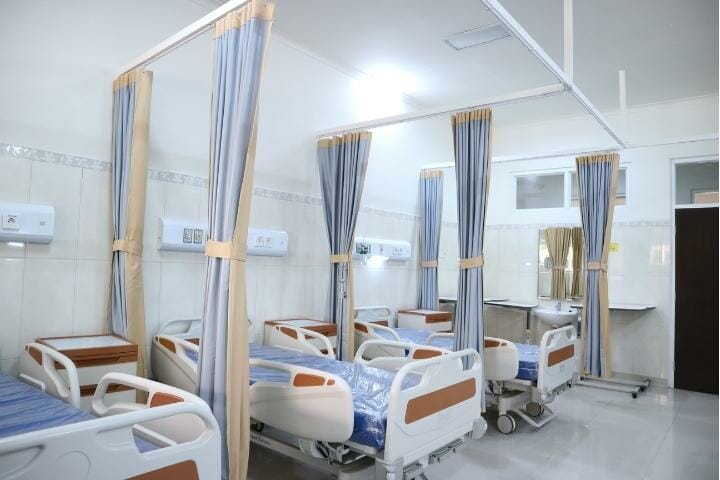When you have to be in the hospital for an extended period of time it can be stressful, especially if you are worried about paying for a hospital bill.

Being on Medicare there are some things you are not covered for, but you may want to make sure you know what type of hospital stay coverage you qualify for before you are going into the hospital.
Contents
Does Medicare Pay for a Hospital Stay?
In short, yes – Medicare will pay for inpatient hospital stays for a certain length of time.
Typically, Medicare pays for the first 60 days of a hospital stay after the covered person has paid the deductible. The exact dollar amount covered will vary depending on how long a person stays in the hospital/facility and which hospital they are staying at.
Read More: Does Medicare Cover Shower Chairs?
What Happens After 60 Days of Hospital Stay?
If a person is required to stay in the hospital, or other medical facility, for longer than 60 days then a coinsurance amount will kick in. After 90 days of staying in the hospital, the person will be completely responsible for all costs of the hospital stay.
For reference, the coinsurance is a percentage of the treatment cost that the person will need to fund themselves. For those who are on a Medicare Part B plan, this amount is 20% of the treatment cost.

After day 60, the person in the hospital will be responsible for paying $352/day and then after the 90 days runs out they will need to pay $704/day.
It’s also important to note that this is 60 day is a lifetime amount of coverage. It is not 60 days at a time, but 60 days for the entire lifetime of the insured person.
What Parts of Medicare Pays for Hospital Stays?
The funding for hospital and other medical facility stays comes from Medicare Part A. However, before Medicare pays the costs of this stay they need to confirm with the doctor that the stay in the hospital is medically necessary.
The coverage, while in the hospital, includes
- A semi-private room
- Nursing care (general, not specialized)
- Meals
- Hospital services and equipment
- Medication that is part of any treatment they are receiving as an inpatient
Read More: What Is a Medicare Audit?
What Are the Out-of-Pocket Expenses a Patient May Need To Pay For?
Medicare mandates that the insured person must have met their deductible requirement before they will start paying for any hospital stay.
The amount of the deductible changes every year, so it’s important to make sure you are up to date on what your deductible is and how much you have paid of it for this year.

The period that Medicare will pay for starts from the first day of hospitalization and will end 60 consecutive days after the insured person’s discharge from the hospital.
If the insured person needs to stay in the hospital again before that period of 60 days is over, then it is considered the same benefit period so they don’t have to meet the deductible twice.
What Type of Hospitals or Centers Are Covered?
Part A will cover the costs associated with staying in a hospital or medical facility, but that doesn’t mean that all of them are covered. There are various types of inpatient facilities so the amount of coverage a person gets will depend on the type of facility they are staying in.
Acute Care Hospitals
These hospitals will provide care for brief periods of injury and illness. Examples of this can include emergency surgery, or urgent conditions like a heart attack or a stroke.
Inpatient Psychiatric Facilities
For people who need treatment for mental health related issues, these inpatient facilities will be covered by Medicare. These facilities will follow the same guidelines in terms of coverage for length of stay, but there is one exception. When it comes to psychiatric treatment, the lifetime amount of days for hospital care is 190 instead of 60.
Rehabilitation Centers
This kind of facility provides treatment after an injury or surgery where a person is not quite ready to go home but they no longer require the acute care facility help.

If a doctor deems it medically necessary, then Medicare will cover the costs associated with a patient staying in rehabilitation center. The expectation here, though, is that this will help the person to become independent and be able to go home after a short stay.
Rehabilitation facilities follow the same fee structure for out of pocket expenses as acute care facilities do.
Long-term Care Hospitals
These are hospitals where the staff is trained to handle medical complex conditions that can take several weeks to recover from. This could be the same hospital that provided the acute care, but a patient will be transferred to a long-term care bed when they are stable.
The coverage from Medicare is the same at both types of hospitals.
Skilled Nursing Facilities
These facilities can provide help with physical therapy, 24-hour on call nursing care and help with tasks like bathing and dressing.
In some cases, a person will only require nursing care for a defined period of time while they recover from a surgery or other injury. However, other people may need long-term care as they have degenerative conditions that are only going to progress over time.
The coverage for Medicare to pay for skilled nursing facilities is a little different than at hospital.
The coverage is only valid for up to 20 days, and then there is a coinsurance that the person must pay ($176/day) after that 20 day period and that last until 100 days of care. After day 100, the person must pay for the full costs themselves.
Medicare will only pay for the costs of skill nursing facilities when a person is transferred here from an acute care facility. If the patient goes into the facility in any other condition or way, then Medicare Part A will not cover the stay.
Read More: What Is The Difference Between Medicare And Medicaid?
Is There Any Way Someone Can Reduce Costs for Hospital Stays?
When you’re ill and in the hospital, worrying about how you’re going to pay for it can just add to the stress you already have.
There are a few ways you can reduce some of your costs when it comes to paying for hospital stays, though.
Medicare Advantage
This plan would be an alternative to regular Medicare, but people with this plan will experience less out-of-pocket expenses when it comes to paying for medical needs – this include daily hospital copayments.

There are a couple catches to this type of plan though. First, the level of coverage may vary and not everyone will qualify for the same type of coverage. Second, they may only cover services or procedures that are done at one of the hospitals in the plan’s network, or that is an approved provider.
Medigap
This is a plan that is a supplemental policy anyone can purchase through a private insurance company. The catch, though, is that it is not available to people who have Medicare Advantage – as that would be like doubling up on insurance.
The point of Medigap is to help pay for costs that regular Medicare does not pay for. It can help with out-of-pocket expenses like coinsurance amounts a person has to pay and cover hospital stays of up to 365 days.
Additionally, a lot of Medigap policies will cover Part A deductibles for hospital stays. The cost a person pays for having this kind of insurance plan will depend on a number of factors. Most importantly in these factors will be the person’s age and where they live.
Each person will need to be quoted as to what type of coverage they can qualify for. There may be additional questions or information a Medigap insurance company will pay for.
Read More: Does Medicare Pay For Hand Controls in Automobiles?
In Summary
Medicare Part A does pay for some of a person’s hospital stay costs, but it’s only up to 60 days in a person’s lifetime. After those 60 days have been used, a person will be expected to pay some type of coinsurance or completely out-of-pocket.
Thankfully, there are additional insurance programs that cover the gaps where Medicare falls short. These top up programs can help reduce your out-of-pocket expenses and make sure that you are not stressed about paying for your medical care when you’re already trying to recover.
If you have questions about your coverage, or Medicare has denied your claim, then you can call your Medicare case worker to discuss the situation.
Some hospital stays are emergent and you don’t know they are going to happen, however if you know you are having a surgery you may want to pre-emptively talk to Medicare to make sure you’re going to be covered or you know what you will be billed for.
Making sure your hospital stay is covered can be a major relief when it comes to recovering from a surgery or injury, and it can really help when you know your insurance is going to be there to pay for your medical care.
Take your time to heal, get the medical help you need, and don’t worry about the bill!
